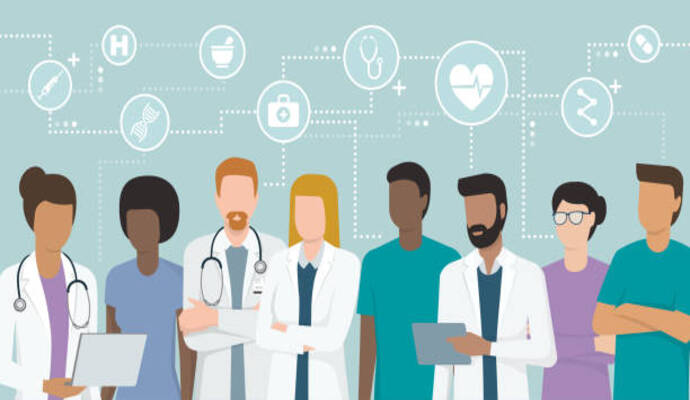GDPR within Healthcare
How is data being used in hospitals/ healthcare?
Healthcare/ hospitals have sensitive and privet data of patients which needs to be protected all the time to avoid any data leak. All personal data of an individual should be processed according to the UK GDPR principles, so that nothing is done against law and individual data is safe. Is important to keep all data confidential not only patient data but also staff data and should not be accessed by untheorized person. Also is employee’s duty to not share their patient date with other employees without their consent. With the electrical health recodes used by hospital now a days there is a benefit of store big amount of data, the disadvantage is that there is security and privacy problem as patient date can be hacked or there can be a virus because of this data can be destroy or change. This will affect the confidentiality of individual and people will lose truest. Patient data store can by anonymise as different patient recodes can get misted up and people will not identify, because of this people will not be identified in case of a breach or someone hack the system people identity will be kept secure and confidential. Also, there is de-personalised where individual is not identified specially if they don’t have any additional information. All patient data used in healthcare/ hospitals should processed and meet all the requirements of Data Protection and GDPR to protect information properly. Also, data patient needs to be aware of what is being process and know about any data leak or branches.
Why do healthcare organisations follow/ implement GDPR and Data Protection?
GDPR is one of the most important laws in UK looking at people’s security particularly surrounding data and its protection. Therefore, this law needs to be clearly maintained by all organisations including healthcare organisations. Within healthcare safety of the publics data is important because of the huge number of patients and staff members hospitals can who need to be protected and feel assured that their data is secured and protected. Due to the handling of vast amounts of sensitive data, healthcare organisations become the target of breaches and cyberattacks so implementing the measures and laws of GDPR sis key to avoid leakage. Furthermore, in the UK, failure to comply to data protections laws can cost organisations 4% of their annual turnover or up to £17.50 million in fines.
How do healthcare organisations follow/ implement GDPR and data protection
Healthcare organisations have the responsibility of GDPR because they act a both the data processors and controllers and so they are responsible to support any staff that carry out these roles on a daily basis.
The health and social Care Act 2018 guides organisations to take essential steps to inform and teach all staff members about security such as through using the Tool Ki comprising of 10 steps. Together these steps help assuring staff are aware of all ways to protect data.
Staff must be trained annually through things such as e-learning programmes. This is typically followed by an annual data security test with an essential high pass mark. This allows hospitals to ensure that all staff are up to date with the newest laws and regulations surrounding data protection.
Also, medical data is only to be accessed by those who are authorised to do so and in case of potential a cyber-attack being detected, they must be reported to management within 12 hours. Management and contracts are held accountable via contracts meeting the security standards of the National Data Guardian.
Another way healthcare organisations comply with data protection is through the structure of their premises. This means that all building is highly secured with CCTV camaras to ensure that serious acts can be detected.
Staff are also trained to stay cautious and are encouraged to follow rules at times. Particularly rules about access such as only accessing rooms that they are to enter and not letting unauthorised personnel to enter those rooms.
Third party companies can access personal data through healthcare organisations when patients agree to it. However, there have been concerns over this concern as to many patients it is not clear how and where their data is used by these third-party companies. Therefore, public authorities including health providers should appoint a Data Protection Officer (DPO) who have the role of responding to any requests made by patients about things such as accessing or removal of data from the organisation.
GDPR requires that consent for data processing must be clear, specific, unambiguous, easily withdrawn and freely given. This ensures that data subjects have control over their data and how it’s used. Therefore, health and mental health data is organised into a special category of processing with additional provisions under Article 9 of GDPR. The issue with consent within healthcare settings is the following: when patients consent to care that needs processing data, they have no apparent choice about whether it is processed which means that they cannot freely consent to the processing itself. Patients also may struggle to withdraw some of this data as doctors and nurses rely on their treatment data for further care.
Digitalisation has helped organisations store big amounts of data in a secure manner. For example, all patient data is stored onto the organisation data log and therefore can be accessed from any hospital and by any medical professional whenever needed, instead of having paper files. A recent development by the NHS was that they created a mobile phone app during the COVID-19 pandemic to track the virus. This app heavily relied on collecting and sharing data to inform others on safety and quarantine measures. Medical apps like this app, store sensitive medical data about each patient which is in risk of being stolen or hacked into therefore patients are required to use authentication security measures such as PINs to accesses more sensitive data.



